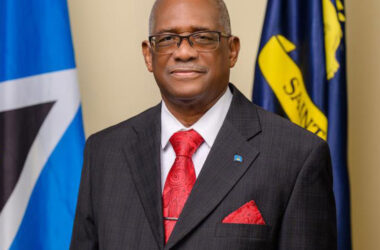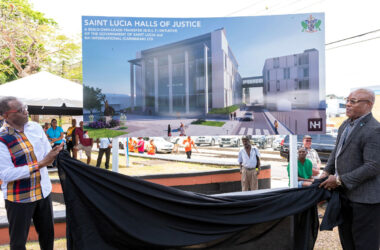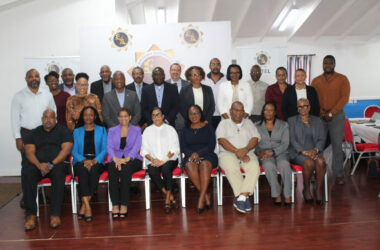The Constitution of Saint Lucia (Amendment) Bill which was being debated in the House of Assembly when we went to press yesterday, and expected to pass through all its stages, puts Saint Lucia well on its way to joining the Caribbean Court of Justice (CCJ), making it the fifth CARICOM member state to do so.
However, the move to repeal the Privy Council and accede to the appellate jurisdiction of the CCJ as the island’s final court of appeal, did not get approval from the Opposition United Workers Party (UWP) which has two members in the country’s 17-seat Lower House of Assembly.
Using social media platforms and traditional media, the UWP decried government’s decision to bypass the holding of a referendum on the issue, claiming that for transparency’s sake, Saint Lucians must vote on whether to stay with the Privy Council or repeal it and go with the CCJ.
“In the making of this decision, there are critical matters to be considered by us as a nation because once made, the decision is irreversible and the consequences are far reaching. Since its inception in 2001, only four out of the 15 jurisdictions that signed on to the establishment of the CCJ have acceded to it fully as their final court of appeal.
The vast majority have been reluctant to proceed or have rejected it outright. The Government of St Vincent & the Grenadines in 2009, and the Governments of Grenada and Antigua & Barbuda in 2018, all held referenda on this issue regarding the CCJ and the public had its say. Ventilation of the issues and public awareness are essential to the process because there are serious and legitimate concerns, many of which have been thoroughly and publicly debated in other jurisdictions of the region whilst the same cannot be said for Saint Lucia,” said the UWP in a statement.
The UWP further stated that a referendum allows for widespread public awareness of the subject, and thorough ventilation of the concerns and issues.
“It (referendum) allows for public debate in island wide town hall meetings and seminars so that all members of the public understand the ramifications of replacing the Privy Council with the CCJ. It is the way to ensure that a decision of this magnitude is made democratically and transparently with the input and consent of the people. It brings the issue directly to the people and removes any doubt that this decision is not truly representative of the will of the people,” noted the UWP in its statement.
But Prime Minister Philip J Pierre and his Cabinet of Ministers disagree with the UWP, calling yesterday “a historic day.”
“It is historic because we as a people are showing that we have confidence in ourselves, that we have confidence in our jurisprudence, and we have confidence in the people of the region. I’m proud and happy to be working with the men and women of the Cabinet, the parliament, and I want to thank the members of the accession committee for the work they’ve done so far and I’m sure that this work is going to continue,” Pierre said.
According to Pierre, his government had followed all the legal processing that needed to be followed for Saint Lucia’s accession to the CCJ. Further, the Supreme Court had ruled that Saint Lucia’s constitution allowed for a government which has a 2/3 majority in parliament to amend the Constitution.
Part 2 of Saint Lucia’s Constitution, under Section 41 (3), which deals with alteration of the Constitution and the Supreme Court Order states thus: “A bill to alter any of the provisions of this Constitution or, as the case may be, of the Supreme Court Order, other than those referred to in subsection (2) shall not be regarded as being passed by the House unless on its final reading in the House the bill is supported by the votes of not less than ⅔ of all the members of the House.”
Said Pierre: “The people of Saint Lucia voted for us by (an overwhelming) majority… and in our manifesto it was stated clearly that Saint Lucia is going to use the Caribbean Court of Justice as its final appellate court. The (acting) governor general in his Throne Speech has consistently said that Saint Lucia is going to be using the Caribbean Court of Justice as its final appellate court.”
Saint Lucia’s transition to the CCJ began more than two decades ago in 2001. Former Prime Minister Dr. Kenny Anthony joined eleven other CARICOM member states and signed the agreement establishing the CCJ. Under Article 25 of the agreement, Saint Lucia as a contracting party agreed that decisions of its Court of Appeal will align to the CCJ. Accession to the appellate jurisdiction of the CCJ will ensure that Saint Lucia falls into full compliance with its solemn international obligation completing the groundwork laid by Anthony.
It has been said that Saint Lucia’s ascent to the CCJ’s appellate jurisdiction will broaden access to justice for the average citizen by eliminating the fees associated with the cost of litigation heard by the Privy Council.














